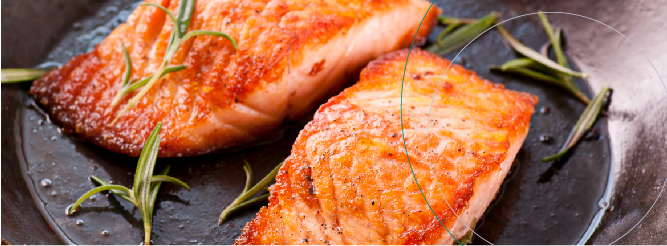
It’s no secret that the food we eat has an impact, either good or bad, on our body’s health. If we’re following a healthy diet, we can see improvements in our mood, our energy levels, sleep patterns, and overall organ functioning; while if we mostly consume processed food or fail to meet the amount of nutrients our body needs, we’ll begin to feel negative effects on our health that could impact us on the long term.
If you do follow a well-balanced diet, you’ll be able to notice how certain food have different benefits, from improving the quality of your skin, your digestion, and your body weight. But did you know that there are several food groups that can improve your memory?
The brain, as any other organ, also benefits from a healthy diet and good water intake, and it’s important to take care of it since it’s responsible for controlling all the other organs.
Scientific research has also proven that certain food groups can maximize how your memory functions and improve your brain health. However, if there’s a more serious, underlying condition, changing how we eat is not a certified cure and there’s only so much food can actually do. At LIMARP®, we want to offer our patients all the necessary tools and information so that they can lead a sustainable and healthy lifestyle. This includes providing nutritional counseling so that they know which food groups are best to target the areas they want to improve.
This article focuses on the best foods for improving how our memory functions, how they can benefit brainpower, and the impact all of this can have on our overall health. Taking on a healthy diet (and an exercise routine!) is highly recommended to ensure that our body is in its best shape, both internally and externally, as possible. Keep in mind that there’s a lot of ongoing research still being carried out on this particular subject and that there are other existing factors that could be impairing your memory or concentration. If you start noticing anomalies or any other type of discomfort, contact your doctor so that they can evaluate you and order some tests.
How Does Memory Work?
Memory is a mind faculty that allows us to retain information over a period of time and it can be understood by dividing it into three segments: the sensory processor, short-term or working memory, and long-term memory. The sensory processor allows us to sense outside information through different stimuli; the working memory retrieves and encodes the information and it can also recall previously stored memories, while the long-term memory stores all the data in categories. Our memory can be affected by many factors, not only external ones, such as pain or physical damage to the brain, and while there’s no definitive solution that alleviates these problems, there are several lifestyle changes you can implement to boost your brain power. In turn, this can help in the long-term when the natural aging of the brain begins to present itself in lack of concentration or memory loss.
A 2008 study published by UCLA found that a person’s brain efficiency, which includes their memory and concentration, can improve by incorporating physical exercise, a healthy diet, and memory exercises into their daily life. However, the lack of follow-up on the people who participated in the study made it hard to determine if it will have a long lasting impact on their overall memory or if they made a significant impact in preventing or slowing any degenerative diseases.
While the connection between improved memory and these lifestyle changes is not 100% proven, it is a fact that diet, exercise, and stress management improve cognitive function, and each of these factors benefit or influence memory in different ways. For this article, we’ll focus on the impact the healthy food has on the brain, but it’s important to point out that a holistic approach, which means including exercise and mindfulness, is the best way to improve your overall health.
The Best Food for the Brain
It’s no secret that a healthy, balanced diet has a positive influence on our bodies, whether it’s providing energy through nutrients or by keeping us in shape, and according to a 2008 study, researchers have started to recognize the ability food has to prevent and protect against diseases. There’s also evidence that while healthy food supports a person’s cognitive processes, food that is high in saturated fat reduces the “molecular substrates that support cognitive processing” and they increase the risk of neurological dysfunction.
The same study states that there’s a relation between gut health and brain health because certain hormones, like leptin and ghrelin, as well as insulin have an impact on emotions and cognitive processes. In addition, the gut also influences the molecular mechanisms that “determine the capacity for acquiring new memories” and overall mental function. This means that consuming healthy food that benefits your gut also contributes to having a healthy brain.
So, now that we’ve established this, we’ll present a list of food that has been linked for better brain power and memory:
- Fatty fish: This food group includes salmon, trout, and tuna, all of which are rich in omega-3 fatty acids and healthy unsaturated fats. The brain uses omega-3s to generate brain and nerve cells, while unsaturated fats are known to lower blood levels of beta-amyloid, which is one of the causes of Alzheimer’s disease. Other research also suggests that people who consume fish at least two times a week usually have more gray matter in their brains. The nerve cells that are found in gray matter are responsible for controlling decision making and memory functioning. If fish is not a viable option for you, you can get omega-3 from supplements or other food like flaxseeds, avocado, and walnuts.
- Caffeine: Whether it’s your morning coffee or a cup of tea in the afternoon, caffeine has proven to have positive effects on the brain because of the high concentration of antioxidants. A 2014 study established that caffeine might help solidify new memories, aside from boosting concentration. Other positive effects include increased alertness, sharpened concentration, and a reduced risk of neurological diseases.
- Fruits: Consuming fruit on a daily basis has always been recommended for maintaining a healthy weight and for its nutrients that our body absorbs.
Some of the fruits that benefit our brain and memory include:
- Berries: They protect the brain from oxidative damage and prevent the brain from aging prematurely and dementia, which is known for impairing memory.
- Grapes: This fruit is high on resveratrol, which is a compound that boosts memory.
- Watermelon: It’s a good source of water, which can improve mental energy, and it has a high concentration of lycopene, an antioxidant that is beneficial for brain health and memory functioning.
- Oranges: Their high levels of vitamin C has been linked with improving a person’s focus, memory, and attention. This vitamin is also a strong antioxidant that protects the brain cells from damage.
- Vegetables: Just like fruits, vegetables are essential for our overall health and leafy greens, such as broccoli, kale, spinach, and collards have been found to be beneficial for brain health. These vegetables are high in vitamin K, which has been linked for improved memory and cognitive status.
- Nuts: This type of food is good for the heart and the brain. A study found that consuming nuts on a daily basis can reduce the risk of cognitive decline and that walnuts also contain omega-3 fatty acids and vitamin E which have shown to generate brain cells and protect the brain.
- Pumpkin seeds: These seeds are strong antioxidants that protect the brain and they contain micronutrients that protect the brain, such as magnesium, zinc, copper, and iron. These elements have proven to be essential for nerve signaling and memory. Also, their deficiency in the body can lead to severe neurological conditions like depression, Parkinson’s, and Alzheimer’s.
These are some specific foods that have shown to have positive effects on the brain and how our memory functions, and what we recommend is that you incorporate them into your daily diet instead of focusing on consuming a single group. A balanced diet, along with exercise, is imperative for healthy brain activity, and if the brain is functioning correctly, the body will follow suit. We’d like to highlight again that if you’re already diagnosed with a degenerative neurological disease, consuming these types of food won’t be a cure, but they can make living with the condition a little easier.
Our memory, along with our concentration and awareness, depend on a healthy brain and just as we focus on eating well to improve our digestion or our circulatory system, we should give the same importance to our other organs. Always contact your doctor if you’re looking to make dietary changes, they will recommend a healthy diet plan and a safe way to follow it.
Contact Us to Learn More
If you’re looking to change your diet and wish to learn more on how to improve your memory through certain food, schedule an appointment with one of our doctors. We can help determine the right treatment for you. Contact us online anytime or give us a call at (619) 373-0229.


